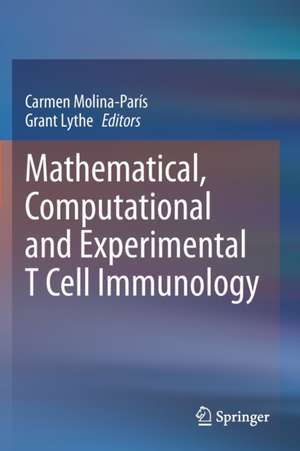Mathematical, Computational and Experimental T Cell Immunology
Editat de Carmen Molina-París, Grant Lytheen Limba Engleză Paperback – 6 ian 2022
| Toate formatele și edițiile | Preț | Express |
|---|---|---|
| Paperback (1) | 1601.25 lei 6-8 săpt. | |
| Springer International Publishing – 6 ian 2022 | 1601.25 lei 6-8 săpt. | |
| Hardback (1) | 1607.49 lei 6-8 săpt. | |
| Springer International Publishing – 5 ian 2021 | 1607.49 lei 6-8 săpt. |
Preț: 1601.25 lei
Preț vechi: 1685.52 lei
-5% Nou
Puncte Express: 2402
Preț estimativ în valută:
306.44€ • 318.74$ • 252.98£
306.44€ • 318.74$ • 252.98£
Carte tipărită la comandă
Livrare economică 14-28 aprilie
Preluare comenzi: 021 569.72.76
Specificații
ISBN-13: 9783030572068
ISBN-10: 3030572064
Ilustrații: X, 298 p. 74 illus., 59 illus. in color.
Dimensiuni: 155 x 235 mm
Greutate: 0.47 kg
Ediția:1st ed. 2021
Editura: Springer International Publishing
Colecția Springer
Locul publicării:Cham, Switzerland
ISBN-10: 3030572064
Ilustrații: X, 298 p. 74 illus., 59 illus. in color.
Dimensiuni: 155 x 235 mm
Greutate: 0.47 kg
Ediția:1st ed. 2021
Editura: Springer International Publishing
Colecția Springer
Locul publicării:Cham, Switzerland
Cuprins
Cytokine receptor signaling and CD4/CD8 lineage choice during T cell development in the thymus.- An agent-based model of T helper cell fate decisions in the thymus.- Modelling naive T cell homeostasis.- Mechanistic models of CD4 T cell homeostasis and reconstitution in health and disease.- Section 1MODELING THE DYNAMICS OF CD4+ T CELLS IN HIV- 1 INFECTION.- Modelling the response to Interleukin-7 therapy in HIV-infected patients.- Modeling immunopathology during persistent viral infections.- Delay in differentiation may suggest division of labour in models for CD8+ T cell differentiation.- Inferring differentiation order in adaptive immune responses from population level data.- Experimental and mathematical approaches to quantify recirculation kinetics of lymphocytes.- The public face and private lives of T cell receptor repertoires.- Population dynamics of immune repertoires.- Mathematical Modelling of T cell activation.- Agent-based model of heterogeneous T cell activation in vitro.- CTLA-4 mediated ligand trans-endocytosis: a stochastic model.- Automated gating and dimension reduction of high-dimensional cytometry data.- Index
Notă biografică
Grant Lythe and Carmen Molina-París are Professors of Applied Mathematics at the University of Leeds. They have coordinated the FP7 Initial Training Network on Quantitative T cell Immunology (2013-2017) and they currently coordinate the H2020 Innovative Training Network on Quantitative T cell Immunology and Immunotherapy (2018-2022).
Textul de pe ultima copertă
The purpose of this book is to present current mathematical and computational models that are used to describe and characterise the immunology of T cells. The reader will be exposed to a variety of tools/methods that go hand-in-hand with the T cell-mediated immunological process that is being modelled.
We aim in the proposed book to emphasise the role that mathematical (or computational) modelling has already played in Immunology. Each chapter will provide an example of the contribution of mathematics to T cell immunology under one of the following four headings:
i) Generation of hypotheses,
ii) Quantification of immunological processes,
iii) Definition of observables to measure given an experimental objective,
iv) reconciling disparate (or even conflicting) experimental results.
We aim in the proposed book to emphasise the role that mathematical (or computational) modelling has already played in Immunology. Each chapter will provide an example of the contribution of mathematics to T cell immunology under one of the following four headings:
i) Generation of hypotheses,
ii) Quantification of immunological processes,
iii) Definition of observables to measure given an experimental objective,
iv) reconciling disparate (or even conflicting) experimental results.
Caracteristici
Features pedagogical content for readers with limited experience in T cell immunology and/or mathematical and computational modelling
Provides a comprehensive, cutting-edge overview of this multidisciplinary field
Written and edited by leading scientists, highlighting invaluable and groundbreaking studies
Provides a comprehensive, cutting-edge overview of this multidisciplinary field
Written and edited by leading scientists, highlighting invaluable and groundbreaking studies
